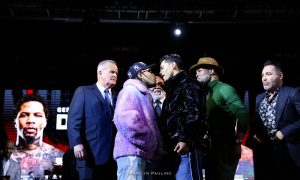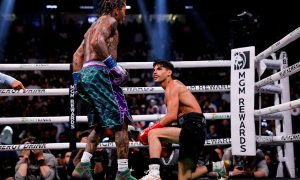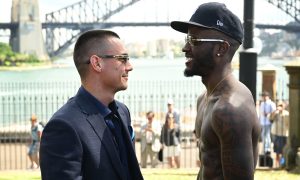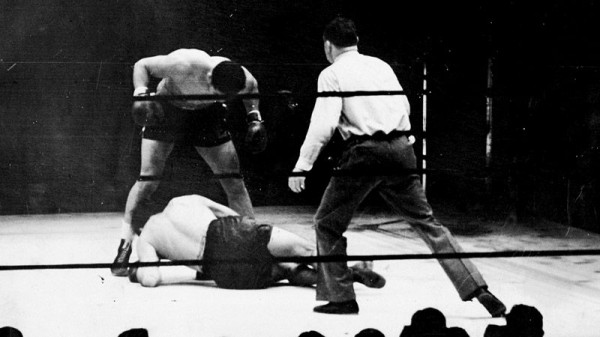 Photo by NY Daily News Archive/Getty Images
Photo by NY Daily News Archive/Getty Images
With the world on the brink of war, bleak and dangerous times were on the horizon. Adolf Hitler had firmly secured power in Germany and The Great Depression held a firm grip on millions around the globe.
President Franklin Roosevelt continued his efforts to keep the United States neutral as war looked imminent.
While many searched for answers, others were looking for a symbol of hope–a hero.
In 1936, American Joe Louis met German Max Schmeling at Yankee Stadium. Louis, who was undefeated, took a tremendous beating from Schmeling.
Rumors swirled that Louis had taken the bout lightly and had been on the golf course more than in the gym. In contrast, Schmeling was in great shape and well prepared.
A 10-1 favorite, Louis was knocked down for the first time in his career in the fourth round and later stopped in the 12th. Americans were stunned by his defeat.
The famous novelist and playwright Langston Hughes was in attendance at Yankee Stadium. He would later provide his account on the reaction to the “Brown Bomber’s” defeat.
“I walked down Seventh Avenue and saw grown men weeping like children, and women sitting in the curbs with their head in their hands. All across the country that night when the news came that Joe was knocked out, people cried.”
The German reaction to the outcome was one of overjoyed euphoria. With perceived Aryan supremacy intact, Hitler sent Schmeling’s wife flowers accompanied with a message that stated, “For the wonderful victory of your husband, our greatest German boxer, I must congratulate you with all my heart.”
Louis rebounded after the loss and began his comeback just two months after being defeated. His first fight was a knockout win over Jack Sharkey.
He would fight an incredible 11 times in a 22 month time span. In that string of victories, Louis knocked out the Cinderella Man, Jim Braddock, to win the Heavyweight crown in June of 1937.
Schmeling continued his career and winning ways as well. Not nearly as active as Louis, he had fought just three times in that same time frame, once at Madison Square Garden and twice in Germany.
As the world stepped into 1938, there was no end in sight to the madness that was being witnessed around the globe. On March 12, Nazi Germany invaded Austria. Then, just three months later in in June, Japan declared war on China.
The future of mankind had reached a pivotal point.
What had become abundantly clear was that as events unraveled at every corner of the earth, Louis stepped forward representing his country and all that Americans recognized as good and great. Understanding the magnitude of what was happening, Louis would confide, “We’re going to do our part…and we’ll will win because God is on our side.”
On the eve of World War II, Louis (35-1, 31 KOs) and Schmeling (52-7-4, 37 KOs) had agreed to a rematch on June 22. It would be Louis’ fourth defense of his Heavyweight crown.
The bout, scheduled for 15 rounds, would again be held at a sold out Yankee Stadium. Nearly 72,000 fans were in attendance to witness what was rapidly becoming a conflict of East versus West and good versus evil.
The fight had become more than a contest between two men. It was widely viewed by many as a test of political ideology.
Despite losing the first bout, Louis was a 3-1 betting favorite in the rematch. He even got a pep talk from President Roosevelt. As Louis recounted, he explained that the President squeezed his biceps and said, “These are the kind of muscles we need to beat Germany with.”
NBC radio announcer Clem McCarthy called the blow-by-blow action. According to and preserved by the National Recording Registry, it is believed that the largest radio audience in history–an estimated 70 million people–listened to the fight.
Louis, 24, went on the attack from the opening bell. Coming forward like a locomotive, he pressed Schmeling and worked behind his stiff left jab.
Schmeling, 33, met Louis in the center of the ring and quickly began retreating after feeling the power of the champion. He wasted little time going to the ropes, desperately trying to fight with his back on or near them.
With one minute gone in the opening round, the two circled back to center ring. Schmeling was looking to counter and land his overhand right. As he began to slowly move backwards towards the ropes, Louis crowded him in close and began firing to the body.
Now in full withdrawal, Schmeling looked helpless. Louis, who was in an all-out seek-and-destroy mode, stepped in and unleashed an 11 punch assault to the head and to the body. Schmeling let out a grisly howl after Louis whacked him with a vicious left hook to the belly.
Collapsing into the ropes, referee Arthur Donovan stepped in to administer the count. Schmeling rose and nodded as Donovan backed away. Louis moved in and within seconds threw a haymaker right hand that tattooed Schmeling flush on the jaw. He crashed to the canvass for the second knockdown of the fight.
He rose at the count of five only to be immediately met by an onrushing Louis who dropped him a third time with a blistering seven punch combination.
The crowd roared as McCarthy used every bit of skill in his arsenal to keep up with the furious pace. Louis was pulverizing the man who had handed him his only career loss just two years ago.
Louis again pounced on Schmeling leveling him with another thundering overhand right to the jaw. Within seconds, Schmeling was on the deck for the fourth time in the fight.
Schmeling was on his hands and knees, desperately trying to climb to his feet, when a white towel of surrender was hurled into the ring.
Though badly hurt and wobbling, the challenger had again risen. His corner had now entered the ring as Donovan signaled a halt to the action.
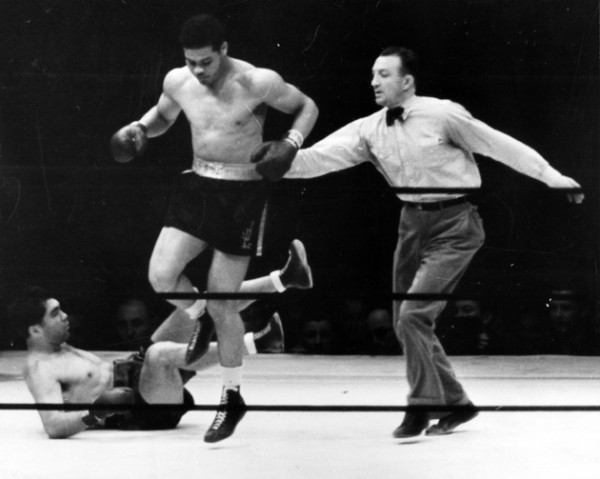 Photo by The Ring Magazine/Getty Images
Photo by The Ring Magazine/Getty Images
The bout was stopped at 2:04 of the first round. Louis had enacted revenge and retained his Heavyweight title.
In Germany, the fight was not heard in its entirety as the Nazi censors cut the radio broadcast early. Louis had single handedly dealt a fierce blow to their professed supremacy.
Ring Magazine selected this fight, large in part due to its historical significance, as the “Fight of the Decade.”
Years later in a 1975 interview, Schmeling was candid on his distaste for being used as propaganda by Hitler and the Nazi’s saying, “Looking back, I’m almost happy I lost that fight. Just imagine if I would have come back to Germany with a victory. I had nothing to do with the Nazi’s, but they would have given me a medal.”
Historians point to Schmeling’s desire to distance himself as early as 1935 by refusing to join the party. He remained steadfast in his beliefs despite pressures applied by the regime.
Louis would volunteer to enlist in the United States Army in January 1942. He remains the only man to ever serve while Heavyweight champion. An American icon who reigned as champion for 12 years, Louis continued his career racking up 66 total victories. He would lose only twice more, once to Ezzard Charles in 1950 and in his final bout against Rocky Marciano in 1951.
Schmeling and Louis would go on to become close friends. In his twilight years, Louis encountered a variety of financial difficulties. Schmeling, who became a successful investor and businessman, privately assisted Louis.
On April 12, 1981, Louis passed away in Las Vegas at just 66 years old. Schmeling, a pallbearer, paid for his funeral.
Schmeling passed on February 2, 2005 in Wenzendorf, Germany. He was 99. Schmeling attributed his longevity to his wife of 54 years.
Despite the brevity of the bout, its historical significance and the friendship that endured between the two will last for eternity.










